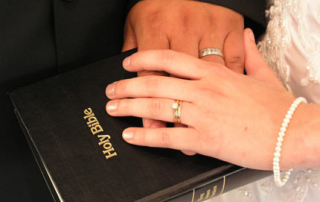The scriptural citation referred to is from Matthew 19:3-9, “…Is it lawful for a man to put away his wife for every cause?’ And he answered…Have ye not read, that he which made them at the beginning made them male and female, and said, For this cause shall a man leave father and mother, and shall cleave to his wife: and they twain shall be one flesh? Wherefore they are no more twain, but one flesh (Genesis 2:24). What therefore God hath joined together, let not man put asunder. They say unto him, Why did Moses then command to give a writing of divorcement, and to put her away? He saith unto them, Moses because of the hardness of your hearts suffered you to put away your wives: but from the beginning it was not so. And I say unto you, whosoever shall put away his wife, except it be for fornication, and shall marry another, committeth adultery: and whoso marrieth her which is put away doth commit adultery.“
With many persons and according to earthly courts, the possibility of a divorce and of remarriage may seem to make people less careful in respect to marriage. However, the “new creature in Christ” (2 Corinthians 5:17) should remember that his/her marriage contract is similar to that between the Lord and the church (his most faithful followers) —perpetual (Ephesians 5:23-33). To the Lord’s people, marriage is therefore a very weighty contract and should be undertaken only after prayerful, thoughtful consideration and examination of every feature bearing upon the situation as far as can be discerned.
Reviewing the context of scripture in the above question, Jesus was answering the Pharisees (who were desiring to tempt him) about Moses’ law regarding divorce. The Pharisees should have already known the law (“Have ye not read,” verse 4) because “unto them were committed the oracles of God” (Romans 3:2). In verse 6, Jesus expressed the sound warning, “What therefore God hath joined together, let not man put asunder.” These words should have silenced the Pharisees, but they did not, just as the hard-hearted Israelites were not silenced who were led of Moses. So, Moses provided a decree of divorcement for those who could not remain at peace with their husbands or wives (Deuteronomy 24:1-5).
Jesus proceeded to show the sanctity of the marriage contract in his further instructions. He stated the only reason God might recognize divorce would be due to “fornication” (the act of sexual intercourse between people not married to each other) unfaithfully committed by a husband or a wife. He also added the husband or wife could not remarry except for the reason of adultery. If they did, both the husband and wife would be guilty of adultery. The man or woman who might later be joined in marriage to one of them would also become an adulterer if the dissolution of the previous marriage was not also due to adultery (Mark 10:11,12; Matthew 5:31,32; 1 Corinthians 7:10-11,39).
For those who might receive a deeper instruction from Jesus’ words because having more of the spirit of the divine law in their hearts (the law of love) he stated, “For I say unto you, that except your righteousness shall exceed the righteousness of the scribes and Pharisees, ye shall in no case enter into the kingdom of heaven” (Matthew 5:20). “Ye have heard that it was said by them of old time, Thou shalt not commit adultery: But I say unto you, that whosoever looketh on a woman to lust after her hath committed adultery with her already in his heart” (Matthew 5:27,28).
For those fully consecrated to the Lord, we must pay close attention to his commands. If one has found their Lord after experiencing a divorce which was not in harmony with the above injunctions and are already remarried, let’s remember that the heavenly Father has provided a means of forgiveness through our Redeemer’s sacrifice.
Additional Resources:
Christian Questions Podcast
Episode #811: “What About Divorce?”
Christian principles on the application of divorce
CQ Rewind Show Notes
Blog Post: My marriage isn’t working; what should I do?











